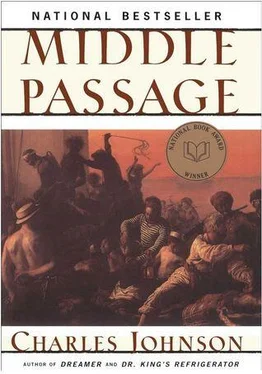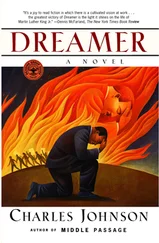Although we’d flung half the skipper’s things into the Drink, shrewd Diamelo told the others his presence was still dangerously alive inside and out, fore and aft, in the steerage and forecastle, bulwark and waterways. Perhaps in them now as well. The evil had not been exorcised. The dragon was not simply a man but the spirit behind his ship, his way of seeing and speaking the world. Therefore he proposed new, emergency conditions for our conduct. The master’s house must be dismantled. Only Allmuseri was to be spoken by the crew when in contact with the newly empowered bondmen. Cringle was to use maps Ghofan was preparing; he did not trust the ones Falcon had left. In addition to this, he forbade us to sing songs in English, his oppressor’s tongue, whilst we worked. He said we must learn their stories. Nurture their god. Allmuseri medicine was to be used to treat sickness and injuries. We were not, of course, to touch their women; in fact, we were to lower our eyes when they passed to show proper respect for a folk we did not understand, had abused because of that, and now must come to for a wisdom we’d ignored. Last of all, until we reached Senegambia we were to dine only on dishes familiar to the Allmuseri — six upon four, since our rations were low.
Little of this lasted, except for each of them going below to feed their god. On both sides, African and American, survivors of the revolt felt too battered to embrace an entirely new regime. When Diamelo offered his proposal, they voted with their feet. Why? Brother, some days we ate candles. Oil. Leather when we had to, saving scraps of dandy funk (or biscuits) for the women and children, who warmed a bit toward Squibb and me. Nevertheless, Diamelo continued to wash himself in salt water whenever Cringle’s shadow fell upon him, cleaned utensils if I touched them first, and took an unusual interest in the operation of the ship’s cannons.
To make matters worse, Death climbed in through every portal. Falcon had left us a drifting laboratory of blood-chilling diseases. That figured, in a way. I mean that blacks would not take the helm of the Republic until the ship was damned near damaged beyond repair, a shadow of her former self, her days of greatness gone — in other words, a vessel you couldn’t give away, even if you tossed in a thousand-league guarantee. We dragged contaminated, pungled bodies to the rail. Two of the Allmuseri had Guinea worms. Being no surgeon, and not feeling all that good himself, Squibb was obliged to improvise as best he could. His prior shipboard experience served him well. He could detect plague by its sweet scent; scarlet fever by an odor like biscuits; insanity (he swore) smelled like rats. Most wounds required amputation. After lopping off the limb, the bloody stump was swathed in a strip of leather, which Squibb left until the whole thing dried out; then he scalded the nub with hot oil or tar, and this meant three of our hunger-bitten deck hands — the newly liberated Africans — were lurching about their tasks minus one leg, or with only two fingers on one hand, or without an arm. To any observer it would seem that a crew of invalids staggered upon the deck. The best dental work Squibb could muster was extraction. He destroyed the exposed nerve with arsenic. Atufal spent his free time carving false teeth for these unfortunates, sometimes using the frontal teeth of the dead to strengthen these crude replacements for the living. As might be expected, every mother’s son on board had lice and eczema, was continually scratching, covered with red blotches, complained of fever, constipation, fatigue, and the bloody flux. Most went barefoot and, therefore, bled about the feet and calves from scratches that ulcerated almost overnight. Besides this, there were cases of distemper, a sort of maddening fever degenerating into a frenzy so violent that the victim ripped away his clothes, shredded his skin, or that of the man next to him, to hanging ribbons, then leaped into the sea. And these, I must add, were the milder cases aboard ship.
Far more dreadful were the sufferers from Black Vomit. This affliction attacked the nervous system and brain. Those so infected took on a yellowish tinge. Fell comatose. Their pulses sank almost too low to feel, and then came fits of delirium. Screams that kept the rest of the crew on edge or near nervous exhaustion, because the victims of Black Vomit went from apparent health to rot in a period of two days. In addition to this, and to crown it all, a handful among us showed signs of tetanus from wounds we had received during the fight. Squibb made heavy water helping them, and remarked sadly, “We’ll be quarantined afore any port lets us put to. Yuh know that, don’t yuh? This bloody ship smells like a pesthouse.”
That stench, I noticed, was on Cringle. When not at the helm, navigating by guess and by God, he lay in Falcon’s cabin, poring over maps and pulling his hair, his skin rucked and sagging, burned down to half his weight. His body jumped with fever. His head was full of bald patches, the remaining tufts of brown hair being starched, bleached, and brittle. Squibb diagnosed his affliction first as typhus, then scabies, and finally as sea scurvy. Actually, it was all three. His legs were swollen. Two wisdom teeth were loose in his head, wobbling in gums going putrid, but he would not stop riffling the skipper’s cabin for sea briefs and old logbooks, or clues — anything! — that would show us the best route back home. “ ’Twas that storm,” he speculated, his topsail-yard voice tightened to a throaty rasp. “I’ve not seen the like of it. Grayback waves over the gunwale. Lightning in the sails. Sky and sea were torn for a spell, or that was what I felt from the bridge.” Leaning back in a busted three-legged chair, nearly tipping it, he pushed away his maps so as to ease his eyes. “You should never have gone for a sailor, lad. If you’d stayed home, you and that lady’d be spliced by now.”
I did not wish to think of Isadora. I rose, felt the sea fall, then my belly, and sat back down. “Have you no running fix on our position?”
“None. Could be near Martinique or São Miguel, for all the bloody charts tell me. We’ve strayed off course, left the sea whose ways I know, and come into a rogue sea I know not.”
“Forget the charts, then. The stars—”
“The heavens are all wrong. That’s what baffles me. They’ve not been in the right place since that gale gave us a dusting. We should never have taken on Allmuseri. They’re foul-weather Jacks. The world tilted because of it, or someone switched the sky on us. You tell me what happened. I’m a simple sailor, Rutherford. All I know is Castor and Pollux aren’t where they should be for another thousand years, or maybe where they were when Copernicus was watching the sky.” He gave a sigh. “Maybe it’s me. .”
“Then we are lost?”
He cleared his throat, but nothing came out. Cringle pinched the bridge of his nose to relieve pressure on his eyes, hesitant to answer me now, and as he rested I remembered the tales spun by old tarpots barely able to hobble up and down the wharves in New Orleans, about cursed ships that sailed forever and were damned never to touch shore. All were created by some catastrophe, they said. After a captain poisoned his crew. Or a high-seas riot. Or when the mates slit a master’s throat in his sleep. Sometimes she was seen off ports struck by plague. Had we become such a phantom ship? As one throws out a net, I pitched him a question, hoping to break his silence and bring something back:
“Why did you sign on?”
He started. “What?”
“Why did you sign aboard the Republic?”
“It wasn’t my decision.” Now he was rubbing his forehead. “My father is a very influential man, as people remind me often — a father to be proud of, I suppose. When he was fifteen he came to America from a poor fishing village near Dorset, came in the belly of a steamer, like the blacks, with two shilling and a half crown in his pocket, and in twelve years he turned it into a fortune that’d buy his family’s village twice over. And people love him, yes, they do, because he is charitable and helps anyone who started out with nothing, as he did. He holds contempt only for the privileged, but ironically that is precisely what his fortune has produced.” Cringle laughed brokenly, his pipebowl bobbing from his mouth like a buoy. “McGaffin was right. I don’t belong here. Like my other appointments, this one was. . arranged.”
Читать дальше












